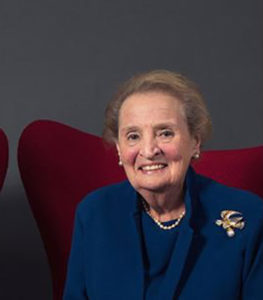Milliband, Albright put forward an economic case for refugee settlement
Two former senior western politicians have called on the world to see refugees as economic assets who have much to contribute to countries around the globe while appealing to states to offer hope to the millions who are currently displaced.
Former British Foreign Secretary and current President of the New York-based International Rescue Committee (IRC) along with former US Secretary of State Madeleine Albright have penned an extraordinary plea for the restoration of the world’s foundering refugee system.
The pair invoked the story of Andy Grove, a refugee from Hungary who founded computer chip maker Intel.
In 1956 and, the then named András Gróf, Andy Grove had survived Hungarian fascism, Nazi occupation, and the invasion of the Soviet Red Army.
He walked from Budapest to Vienna, where he reached the offices of the IRC; an organisation founded by Albert Einstein to help people fleeing violence and persecution.
The IRC put Grove on a boat to the US. When he arrived at Ellis Island, he took the name Andy Grove.
“He went on to become co-founder and CEO of Intel. He is recognised today as one of the people who profoundly shaped Silicon Valley and the digital transformation of the world economy. The decision to admit this one refugee created immense prosperity for America,” the pair wrote.
“Not every person fleeing violence is the next Andy Grove, but his story represents a basic truth: when given the opportunity to rebuild their lives in a welcoming country, refugees make enormous contributions,” they wrote.
“Despite being among the most vulnerable and destitute when they arrive, the data shows that refugees work hard and quickly become net economic contributors in their host societies. In other words, resettling refugees is not just the right thing to do – it’s the smart thing, too.
“Yet today, the global refugee resettlement system is breaking down. There are approximately 1.4 million refugees worldwide who are in need of urgent resettlement – either because of their ethnicity, religion, sexual orientation or poor health.
“But in 2018, just 100,000 refugees were resettled, down from the previous year’s 180,000. Countries that once proudly welcomed refugees are closing their doors. Under the Trump administration, the US is less welcoming to the international homeless now than at any time in modern memory.
“This moment demands bold action – not only to revive the bipartisan American tradition of resettling refugees, but to broaden the coalition of countries accepting the world’s most vulnerable people.
“At the IRC, we have concluded that persuading more countries to accept refugees requires a new coalition of actors – from the private sector, philanthropy and civil society – to address three constraints that hold countries back from doing more.
“We can make the economic argument even more compelling. Right now, when a refugee is resettled, agency representatives decide which town or city to send them to, based on a wide range of criteria.
“Our partners at Stanford University have developed an algorithm to improve placement decisions by harnessing employment data — the skills and characteristics of refugees, available jobs in a community, housing costs and other local factors. If we applied the algorithm to the 25 cities where we work today in the US, the employment rate of refugees after three months could be 40% higher.
“In Switzerland, the algorithm yields a 70 per cent improvement.
“While refugees go on to become economic contributors, they require up-front investment of between $10,000 and $20,000 to cover the costs of plane tickets, the first few months of housing, and language training. In some countries, enough political will exists to resettle refugees, but not enough to win spending battles at a time of tight public finances.
“An answer to this problem is to borrow from the models developed in global health, climate finance, and social impact bonds, which have harnessed private finance for public good.
“At the IRC, we are exploring the possibility of creating a financial facility that pays for the initial cost of resettling refugees. This investment would then be paid back using the refugees’ tax contributions as they work.
“Finally, we have to deal with the more intangible concern that refugees often face a backlash from local communities. When a refugee is resettled in Canada, a few members of the public – from a church or local organization – come together to act as their legal sponsors.
“This group finds housing, gets children into school, connects them with local jobs, and, like volunteers in the US, provides guidance on everything from transportation to financial literacy. Two million Canadians, or 7 per cent of the adult population, have now sponsored a refugee.
“By using a digital platform, we believe we can spread the sponsorship model, so that it is much easier to recruit sponsors, match them to refugees, and provide sponsors with the information and support needed to help refugees.
“Taken together, these three solutions can change the way governments make decisions. There is no easy fix to the current global refugee crisis.
“But if people see that refugees will be an economic asset, at no up-front cost, with an army of citizens prepared to integrate them and support the cause, we believe the political dynamic around refugee resettlement will begin to shift – offering hope to millions of refugees around the world who carry the same dreams that Andy Grove once did.”
Laurie Nowell
AMES Australia Senior Journalist












